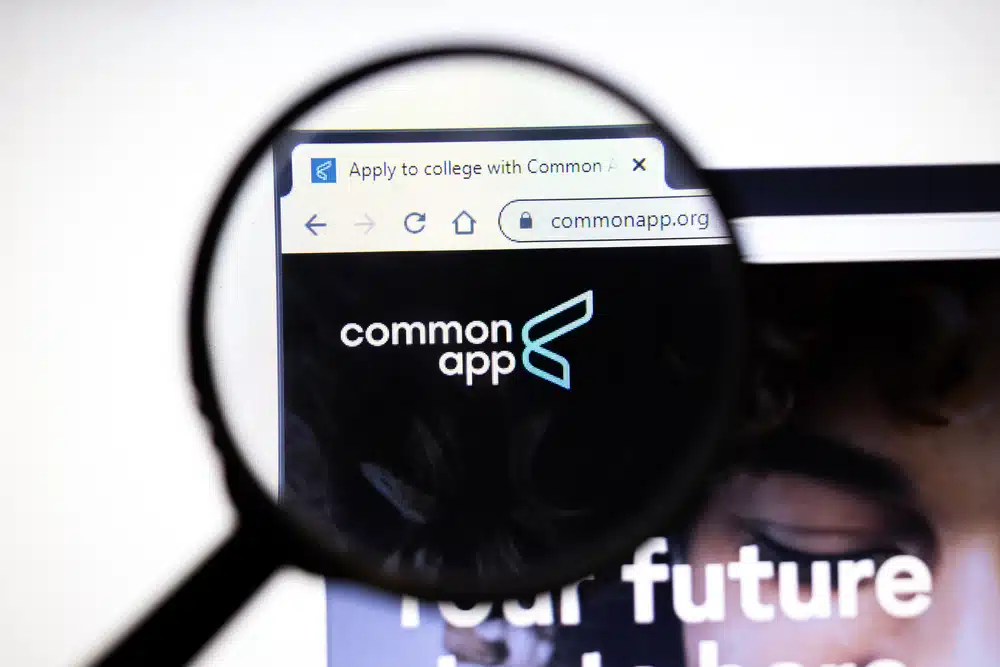Common App Essay Prompts 2023-2024
Embarking on the journey to college is a milestone filled with excitement, aspirations, and a bit of nervousness. One crucial step in this adventure is the Common Application essay, a unique opportunity for you to showcase who you are beyond grades and test scores. For the 2023-2024 admissions cycle, the Common App offers several essay prompts, each inviting you to share your personal stories, thoughts, and dreams.
In this blog, we’ll dive into the heart of these prompts, unraveling their nuances to help you understand what each one really seeks. Whether you’re an aspiring artist, a science enthusiast, a community leader, or someone with a story to tell, there’s a prompt for you. Our goal is to guide you in selecting the prompt that resonates most with your experiences and ambitions, and to provide practical tips for crafting an essay that stands out.
Remember, your Common App essay is more than just words on a page; it’s a window into your world. Let’s explore these prompts together and set you on the path to the college of your dreams.
What is the Word Limit for the Common App Essay?
The word limit for the Common App essay is typically 650 words. It’s important to stick to this limit as closely as possible; admissions officers have a lot of essays to read, and an essay that is significantly over or under the word count might not be looked upon favorably. Each word should be carefully considered, and every sentence should serve a purpose in conveying your message and showcasing who you are.
How Many Common App Essays Are Required?
The Common App requires you to write one essay based on one of the prompts provided. This single essay will be sent to all the Common App colleges you apply to.
However, it’s important to note that some colleges may require additional supplemental essays that are specific to their institution. These are separate from the main Common App essay and usually focus on topics that help the college understand how you might fit into their specific college environment. Always check the requirements for each college to which you’re applying to ensure you complete all necessary essays.
When was the Common App Essay Prompts for 2023-2024 Released?
The Common App essay prompts for the 2023-2024 application cycle were made available in late January 2023.
This early release gives prospective applicants plenty of time to think about which Common App essay prompt resonates most with them and to start drafting their essays. It’s a good idea to keep an eye on the official website or their announcements for the most current information regarding application cycles and Common App essay prompts.
What are the Common App Essay Prompts for 2023-2024?
The Common App has decided to keep the essay prompts the same for the application year 2023-2024 because they have been very well-received by students, counselors, advisors, teachers, and member colleges. In fact, their past research has shown that overall satisfaction with the prompts exceeded 95% across all of these groups.
This is likely due to the fact that the prompts are open-ended and allow students to share their stories and experiences in a way that is personal and meaningful. Additionally, the prompts are not too specific, which gives students the freedom to write about whatever they want. This flexibility is important, as it allows students to show admissions officers who they are as individuals.
Below is the full set of Common App essay prompts for 2023-2024.
- Some students have a background, identity, interest, or talent that is so meaningful they believe their application would be incomplete without it. If this sounds like you, then please share your story.
- The lessons we take from obstacles we encounter can be fundamental to later success. Recount a time when you faced a challenge, setback, or failure. How did it affect you, and what did you learn from the experience?
- Reflect on a time when you questioned or challenged a belief or idea. What prompted your thinking? What was the outcome?
- Reflect on something that someone has done for you that has made you happy or thankful in a surprising way. How has this gratitude affected or motivated you?
- Discuss an accomplishment, event, or realization that sparked a period of personal growth and a new understanding of yourself or others.
- Describe a topic, idea, or concept you find so engaging that it makes you lose all track of time. Why does it captivate you? What or who do you turn to when you want to learn more?
- Share an essay on any topic of your choice. It can be one you’ve already written, one that responds to a different prompt, or one of your own design.
How to Answer the 2023-2024 Common App Essay Prompts
Prompt #1
Some students have a background, identity, interest, or talent that is so meaningful they believe their application would be incomplete without it. If this sounds like you, then please share your story.
This Common App essay prompt invites students to share a personal aspect (background, identity, interest, or talent) that is central to their sense of self. The prompt seeks an intimate glimpse into the student’s life, highlighting something that they consider integral to their identity. It’s an opportunity for students to present a unique narrative that showcases their individuality and what makes them stand out.
1. Exploring Background or Identity: Students should reflect on elements of their background or identity that have shaped their perspectives, values, and goals. This could include cultural heritage, family history, or a significant life event. When discussing this, it’s important to focus not just on the background itself but on how it has influenced personal growth, worldview, and aspirations. For instance, a student from a multicultural family might discuss how navigating different cultural norms has developed their adaptability and understanding of diversity.
2. Highlighting a Unique Interest: This is a chance for students to delve into a passion that excites them, whether it’s a conventional hobby or something more unusual. They should explain why this interest is important to them, how they have pursued it, and what it says about their personality or values. For example, a student deeply engaged in environmental activism could discuss how this interest has fueled their desire to pursue a career in environmental science, showcasing their commitment to making a positive impact.
3. Showcasing a Talent: If focusing on a talent, students should go beyond simply stating their skill. They should narrate the journey of discovering and developing this talent, the challenges faced, and the achievements attained. This could range from artistic talents to sporting prowess or a knack for a particular academic field. The key is to demonstrate how this talent has contributed to personal development and how it aligns with their future goals.
4. Narrative and Reflection: Regardless of the chosen aspect, the essay should tell a compelling story. It’s not just about describing the background, interest, or talent but also reflecting on its significance. Students should consider how their unique attribute has shaped their outlook, influenced their choices, and prepared them for the future. This reflective element is crucial as it allows admission officers to understand the student’s introspective abilities and how they derive meaning from their experiences.
Ultimately, the essay should be deeply personal, offering a window into the student’s life that reveals something significant about who they are. It’s an opportunity for self-expression and to demonstrate the unique qualities they will bring to the college community.
Prompt #2
The lessons we take from obstacles we encounter can be fundamental to later success. Recount a time when you faced a challenge, setback, or failure. How did it affect you, and what did you learn from the experience?
This Common App essay prompt invites students to reflect on a significant challenge, setback, or failure they have faced and to explore the lessons learned from that experience. The prompt emphasizes the value of resilience and personal growth that can arise from difficult situations. Here’s how a student might approach answering this prompt:
1. Identifying a Meaningful Challenge: The student should begin by selecting an obstacle or setback that had a significant impact on their life. This could be an academic challenge, a personal struggle, a failure in a project or competition, or a difficult situation in their personal life. It’s important that the challenge is meaningful and has genuinely affected the student. The chosen experience should offer enough depth to explore both the challenge itself and the growth or learning that resulted from it.
2. Describing the Experience: The student should vividly describe the situation, providing enough context to understand the nature of the challenge and its significance. This part of the essay should include specific details: what happened, when and where it occurred, who was involved, and what the immediate consequences were. A well-crafted narrative will help the admissions officers visualize the situation and empathize with the student’s experience.
3. Reflecting on the Impact: This key point involves the student discussing how the challenge, setback, or failure affected them at the time. This can include emotional, intellectual, or even physical effects. The student should be honest and open about their feelings and reactions. This reflection shows the admissions officers the student’s level of self-awareness and emotional maturity.
4. Learning and Growth: Finally, the student should articulate what they learned from the experience and how it contributed to their personal growth. This could be a newfound understanding, a skill they developed, resilience, or a change in perspective. The student should explain how this experience has prepared them for future challenges and how it might influence their approach to situations in college and beyond. This part of the essay demonstrates the student’s ability to learn from their experiences and to turn challenges into opportunities for growth.
Overall, in answering this prompt, the student has the opportunity to showcase their resilience, personal growth, and the ability to learn from difficult experiences—qualities that are highly valued in the college environment.
Prompt #3
Reflect on a time when you questioned or challenged a belief or idea. What prompted your thinking? What was the outcome?
This 2023-2024 Common App essay prompt focuses on a moment when the student questioned or challenged a belief or idea. It’s about introspection, critical thinking, and the impact of challenging preconceived notions or widely held beliefs. The prompt seeks to understand the student’s reasoning process, their courage in confronting established ideas, and the consequences of their actions or thoughts. Here’s how a student might approach answering this prompt:
1. Choosing a Significant Belief or Idea: The first step is for the student to select a belief or idea they have questioned or challenged. This could be a personal, cultural, societal, or academic belief. The chosen belief or idea should be substantial and meaningful, providing a solid foundation for the essay. It could be something that directly affected the student or a broader issue that they felt strongly about. The key is that it should be a belief or idea that genuinely provoked thought or discomfort in the student, prompting them to question or challenge it.
2. Describing the Prompting Event or Thought Process: The student should explain what specifically prompted them to question or challenge this belief or idea. This could be a personal experience, an event they witnessed, something they read or learned, or even an internal dialogue. It’s important to convey not just the event or thought itself, but also why it was significant to the student and how it sparked a change in their perspective or understanding.
3. Explaining the Challenge Process: Here, the student should detail how they went about questioning or challenging the belief or idea. This could involve personal reflection, seeking out more information, discussions with others, or even taking some form of action. The focus should be on the student’s thought process and actions, demonstrating their critical thinking, curiosity, and willingness to delve into complex or uncomfortable topics.
4. Discussing the Outcome and Personal Growth: Finally, the student should reflect on the outcome of challenging this belief or idea. This could include changes in their own thinking, impacts on their relationships or community, or even broader effects if their challenge led to some form of action or change. Most importantly, the student should discuss what they learned from the experience and how it contributed to their personal growth. This might include a greater understanding of themselves, others, or the world around them, and how this experience has shaped their current beliefs and approach to new ideas.
Through this essay, the student has the opportunity to showcase their ability to think critically and independently, challenge the status quo, and reflect on their personal growth and learning. This approach demonstrates a maturity and openness to new ideas that are highly valued in an academic setting.
Prompt #4
Reflect on something that someone has done for you that has made you happy or thankful in a surprising way. How has this gratitude affected or motivated you?
This Common App essay prompt invites students to reflect on an instance where someone’s actions have led to feelings of happiness or gratitude in a surprising way. It’s about recognizing and appreciating the impact of others’ kindness or support, and considering how this experience of gratitude has influenced or motivated the student. Here’s how a student might approach answering this prompt:
1. Selecting a Memorable Act of Kindness: The student should start by identifying a specific instance where someone did something that made them feel unexpectedly happy or grateful. This could be a small, seemingly insignificant gesture or a larger act of kindness. The key is that it should be something that genuinely surprised the student and led to a strong emotional response. This act could be from a family member, friend, teacher, or even a stranger. It’s important that the act had a meaningful impact on the student’s life.
2. Describing the Act and Initial Reaction: The student should vividly recount the act itself and their initial reaction. This involves detailing what was done, the context in which it happened, and why it was surprising. The description should convey the emotional significance of this act to the student, capturing not only the event but also the feelings of happiness or gratitude it evoked.
3. Exploring the Depth of Gratitude: Here, the student delves into their feelings of gratitude, explaining why this act was particularly meaningful. This might involve discussing the circumstances they were in at the time, their relationship with the person who performed the act, or why the act was especially touching or needed. This exploration should show a deep level of introspection and understanding of how small acts can have a big impact.
4. Reflecting on the Impact and Motivation: Finally, the student should articulate how this experience of gratitude has affected or motivated them. This could involve changes in their own behavior, how they relate to others, their perspective on acts of kindness, or their approach to facing challenges. The student should discuss how this experience has inspired them to act differently, be more appreciative, or pass on kindness in their own way. This part of the essay is crucial as it demonstrates personal growth and the ability to learn from experiences of gratitude.
Through this essay, students have the opportunity to showcase their capacity for empathy, their ability to appreciate the small things in life, and how they have been inspired to grow and develop as a person as a result of others’ actions. This prompt allows for a personal and potentially touching narrative that can resonate strongly with admissions officers.
Prompt #5
Discuss an accomplishment, event, or realization that sparked a period of personal growth and a new understanding of yourself or others.
This 2023-2024 Common App essay prompt asks the student to reflect on a specific accomplishment, event, or realization that led to personal growth and a new understanding of themselves or others. The focus is on transformation and self-discovery, exploring how a particular experience contributed to the student’s development and changed their perspective. Here’s a detailed approach for a student to consider:
1. Identifying a Pivotal Experience: The first step is for the student to select an accomplishment, event, or realization that had a significant impact on their personal growth. This could be anything from a major life event, a significant achievement, a challenging obstacle they overcame, or a moment of clarity or profound insight. The chosen experience should be one that marks a clear before-and-after in their understanding of themselves or others, and it should have enough substance to explore in depth.
2. Describing the Experience: The student should vividly recount the experience, providing a clear picture of what happened. This includes setting the scene (when and where it occurred), the people involved, and what specifically took place. If it’s a realization, the student should describe how this moment of clarity came about. The description should be engaging and detailed, allowing the reader to fully grasp the significance of the experience.
3. Exploring the Impact on Personal Growth: Here, the student needs to delve into how the experience contributed to their personal development. This could involve discussing new skills or strengths they developed, changes in their attitudes or beliefs, or newfound confidence or resilience. The student should be introspective, reflecting on how they evolved as a result of this experience. This part of the essay shows the depth of the student’s self-awareness and their capacity for growth.
4. Understanding of Self or Others: The final key point involves the student explaining how the experience led to a new understanding of themselves or others. This might include a change in perspective, a greater sense of empathy, a new appreciation for certain values or relationships, or a reevaluation of their goals and priorities. The student should articulate how this new understanding has influenced their actions, decisions, and outlook on life.
In answering this prompt, the student has the opportunity to demonstrate maturity, self-reflection, and the ability to learn and grow from their experiences. This narrative can be particularly compelling to admissions officers, as it showcases the student’s personal development and preparedness for the challenges and opportunities of college life.
Prompt #6
Describe a topic, idea, or concept you find so engaging that it makes you lose all track of time. Why does it captivate you? What or who do you turn to when you want to learn more?
This Common App essay prompt is an invitation for the student to delve into a topic, idea, or concept that deeply fascinates them. It’s about exploring a passion that is so absorbing that it makes them lose track of time. This prompt aims to uncover the student’s intellectual curiosity, what drives their enthusiasm, and how they engage with and pursue their interests. Here’s how a student might approach answering this prompt:
1. Selecting a Topic: The student should begin by identifying a topic, idea, or concept that truly captivates them. This could be an academic subject, a hobby, a philosophical question, a social issue, or anything else that genuinely intrigues and excites them. The chosen topic should be something they are passionate about and have spent considerable time exploring. It’s important that this topic is not just a passing interest but something that deeply engages them.
2. Explaining the Captivation: The student should describe why this topic is so engrossing. This might include detailing the specific aspects that fascinate them, how they discovered this interest, and why it stands out from other interests or hobbies. This section should convey the student’s passion and enthusiasm, providing insight into what drives their curiosity and why this topic, in particular, resonates with them so strongly.
3. Describing the Engagement Process: Here, the student should explain how they engage with the topic. This could include activities they do to learn more about it, how they go about exploring or practicing it, and any projects or achievements they have pursued related to this interest. The student should also mention any challenges they have encountered in their pursuit and how they have overcome them. This section showcases the student’s commitment and the depth of their engagement with the topic.
4. Discussing Resources and Learning: Finally, the student should talk about what or who they turn to when they want to learn more about this topic. This could be books, websites, communities, mentors, teachers, or even personal experiments or observations. The focus here should be on illustrating the student’s proactive approach to learning and exploring their interest. This part of the essay demonstrates their resourcefulness and the lengths they go to in order to deepen their understanding and involvement.
Overall, this essay allows the student to share a personal and meaningful aspect of themselves, highlighting their passion, intellectual curiosity, and the joy they find in learning. It’s an opportunity to show the admissions committee what excites and motivates them, providing a glimpse into their personal world of interests and passions.
Prompt #7
Share an essay on any topic of your choice. It can be one you’ve already written, one that responds to a different prompt, or one of your own design.
This Common App essay prompt is notably open-ended, offering students the freedom to choose any topic they are passionate about. It’s an opportunity for students to showcase their unique perspective, interests, and creativity. The prompt is about giving students the liberty to express themselves in a way that might not fit into other more structured prompts. Here’s how a student might approach answering this prompt:
1. A Topic That Reflects Personal Identity or Passion: Since the prompt is so open, the student should choose a topic that is genuinely important or interesting to them. This could be a personal hobby, an issue they are passionate about, a significant life event, a unique experience, or even a fictional story if they are inclined towards creative writing. The key is to pick a topic that allows the student to share something meaningful about themselves. It could also be an opportunity to showcase a talent or interest that is not evident from other parts of their application.
2. Ensuring Originality and Depth: The chosen topic should allow for originality and depth of thought. It should not be a generic or overly common topic unless the student can approach it from a unique angle. The essay should delve into specifics rather than remaining on a superficial level, allowing the student to demonstrate critical thinking, analytical skills, and personal insight.
3. Structuring the Essay Effectively: Despite the open-ended nature of the prompt, the essay should still have a clear structure – an engaging introduction, a coherent body that elaborates on the topic, and a thoughtful conclusion. The structure should facilitate a smooth flow of ideas, making the essay both coherent and compelling. This will help to keep the reader’s attention and make the essay memorable.
4. Reflecting Personal Growth or Perspective: Regardless of the topic, the essay should offer insights into the student’s personality, values, or perspective. It could reflect personal growth, a change in perspective, or an affirmation of the student’s beliefs and values. The goal is to give the admissions committee a deeper understanding of who the student is beyond grades and test scores, showcasing their individuality and potential contribution to the college community.
By thoughtfully selecting a topic and using this opportunity to express something truly personal and reflective of their individuality, students can create a compelling and memorable essay that stands out in the admissions process.
Tips for Selecting the Right Prompt for You
Choosing a Common App essay prompt requires careful consideration of your experiences, values, and goals. Here are two key points to guide your decision-making:
1. Reflect on Significance and Personal Connection. Consider the prompts in light of your life experiences. Reflect on what aspects of your background, identity, interests, or talents have significantly shaped you. Choose a prompt that allows you to share a meaningful story that provides insight into who you are.
Considerations: Think about the personal stories or experiences that have had a profound impact on your life. Ask yourself which prompt aligns best with those experiences and allows you to convey their significance. This may involve examining your values, passions, and the moments that have shaped your identity.
2. Choose a Prompt that Aligns with Your Strengths: Evaluate the prompts based on your strengths as a storyteller and communicator. Opt for a prompt that allows you to showcase your ability to reflect, learn, and articulate experiences effectively.
Considerations: Consider your writing style and the stories you can tell with authenticity and depth. Choose a prompt that plays to your strengths as a communicator. For instance, if you excel at analyzing and learning from challenges, the prompt about facing obstacles may be a strong fit for you. Alternatively, if you have a compelling personal growth story, consider a prompt that allows you to delve into that transformation.
Ultimately, the chosen prompt should resonate with you and offer an opportunity to present a unique aspect of your character or experience. Whether it’s through overcoming challenges, exploring your passions, or reflecting on personal growth, select a prompt that allows you to tell a compelling story that adds depth to your application.
Structuring Your Essays
The structure of an essay, especially in the context of the Common Application, is crucial for several reasons. Firstly, a well-structured essay helps convey the applicant’s thoughts and experiences in a coherent, compelling manner, making it easier for admissions officers to understand the applicant’s unique perspective. Secondly, a structured approach helps in efficiently addressing the prompt, ensuring that all relevant aspects are covered. Finally, a good structure reflects the applicant’s organizational skills and ability to communicate effectively, which are important traits for college success.
Here are three key points on how an applicant can structure their Common App essays:
1. Interpreting the Prompt: Start by carefully analyzing the chosen prompt among the Common App essay prompts for 2023-2024. Understand what the prompt is asking and identify the key elements you need to address. For instance, if the prompt is about a challenge you’ve overcome, break it down into the situation, the action you took, and the impact it had on your personal growth. This initial step is crucial for setting a focused narrative path.
2. Creating a Compelling Narrative: After understanding the prompt, structure your essay in a way that tells a story. Begin with an engaging introduction that sets the scene and introduces the central theme or conflict. The body of the essay should then delve into the specifics, providing details about your experiences, reflections, and learnings. Each paragraph should seamlessly lead to the next, maintaining a natural flow. Using the “show, don’t tell” technique can be particularly effective, where you illustrate your points through anecdotes and examples rather than mere assertions.
3. Concluding with Reflection and Insight: The conclusion should not just summarize the essay but also reflect on the broader implications of your story. Tie back to the prompt to show how your narrative directly addresses it. This is the place to highlight your growth, insights, or how the experience has shaped your perspective and future goals. A strong conclusion leaves a lasting impression, reinforcing the key message of your essay.
Throughout the essay, maintain a balance between creativity and clarity. While it’s important to be creative in your storytelling, clarity should not be sacrificed. The goal is to showcase your personality, experiences, and aspirations in a way that resonates with the admissions committee, all while staying true to the chosen Common App essay prompts for 2023-2024.
Polishing Your Common App Essay
Effectively revising and proofreading essays, especially for the Common App essay prompts 2023-2024, is crucial in crafting a compelling and error-free application. Here are four key points to consider for a thorough and effective revision and proofreading process:
1. Understanding the Prompt’s Intent: Before beginning the revision process, applicants should revisit the specific Common App essay prompt they are responding to. It’s essential to understand deeply what the prompt is asking. Applicants should ask themselves if their essay addresses the prompt fully and if it provides a clear, cohesive narrative or argument. This is especially important for the 2023-2024 Common App prompts, as they are designed to elicit thoughtful and personal responses. Ensuring that the essay aligns well with the prompt’s intent is the first critical step in the revision process.
2. Seeking External Feedback for Perspective: One effective strategy is to have others read the essay – teachers, mentors, peers, or family members. Fresh eyes can offer new perspectives and catch issues that the writer might have overlooked. This external feedback is invaluable, as it can highlight areas where the arguments or narratives are unclear, where the language could be more engaging, or where the essay doesn’t quite convey the intended message or tone. Additionally, this feedback can be particularly useful in ensuring that the essay resonates with individuals from various backgrounds, mirroring the diverse audience of college admissions officers.
3. Focusing on Structure, Flow, and Clarity: In the revision process, it’s important to look critically at the essay’s structure. Does it have a clear introduction, body, and conclusion? Do the ideas flow logically? Applicants should check for transitions between paragraphs and ensure that each paragraph serves a clear purpose and contributes to the overall narrative or argument. It’s also crucial to revise for clarity – ensuring that the language is precise and the meaning of each sentence is clear. This involves choosing the right words, varying sentence structure, and avoiding jargon or overly complex phrases, especially considering the diverse audience of the Common App essay prompts.
4. Detailed Proofreading for Grammar and Conventions: The final step, proofreading, is about polishing the essay to be error-free. Applicants should meticulously check for grammar, punctuation, and spelling errors. Tools like grammar checkers can be helpful, but they are not infallible, so careful, line-by-line reading is crucial. Consistency in style, such as the use of tenses and voice, is also important. Proofreading is not just about correcting mistakes; it’s about ensuring the essay is as readable and professional as possible, reflecting the applicant’s attention to detail and commitment to presenting their best self.
By incorporating these strategies into their revision and proofreading process, applicants can enhance the quality and effectiveness of their essays for the Common App essay prompts 2023-2024, thereby improving their chances of making a strong impression on admissions committees.
The Importance of the Common App Essay in College Admissions
So, why is this essay a cornerstone of your application? Imagine an admissions officer sifting through stack upon stack of near-identical transcripts and test scores. It’s the essay that can stop them in their tracks. Here’s where you breathe life into your application, transforming from a two-dimensional paper persona into a three-dimensional human being with passions, fears, and aspirations.
It’s the perfect setting to convey growth and maturity, to show the folks in the admissions office that you’ve got the grit and gumption to tackle the challenges of college life. It’s your personal spotlight, a narrative stage where you’re the protagonist, and the theme is personal growth, character, and potential.
Beyond the Common App Essay
Okay, let’s focus. You’ve finished your essay and are ready to send it off. But first, take a deep breath and think about what you’ve done. This essay is more than just words on a page. It’s a part of your life story, showing who you are through your experiences.
Remember, submitting your essay is the start of something new, not the end. Even if you’re nervous, know that you’ve done something great by sharing your thoughts and feelings. After you send it, you’ll have to wait for a response, which can feel slow and stressful. But use this time to think about what you’ve learned and to enjoy other parts of your life like friends, hobbies, and small daily moments.
It’s also good to have backup plans. Your first choice might not work out, but there are many other ways to reach your goals, some of which you might not have thought of yet. Think about what writing this essay has taught you, not just about writing but about yourself. These lessons will help you in the future.
Don’t forget to thank the people who helped you along the way, like teachers, friends, and family. Being thankful is important, especially when you’re dealing with the stress of college applications.
Once you’ve sent off your essay, you have to let go and wait for what happens next. This is a chance to learn how to be okay with not being in control. Whatever the outcome, you’ve already achieved a lot.
Finally, think about what comes after this. No matter what happens with your application, you will keep growing and moving forward. This essay is just one step in your larger journey. Keep your head up and stay focused on the future.
The Last Word: It’s Just the Beginning
And here we are, at the last word. Remember, this is just the beginning of your story. You’re the author of your life, and so many chapters are yet to be written. Your potential is a book with infinite pages. So dream big, aim high, and keep writing your story—one word, one day, one dream at a time.
When you look back on this article, regardless of the outcome, I hope you see it as a time capsule of your younger self—a version of you full of hope and on the brink of a grand adventure. Be proud of this work, of this moment, and of the person you are becoming.
Now, go ahead. Take that step, hit submit, and let’s see where this wonderful, wild ride takes you next.
It is important to have all the necessary information before making any decision. AdmissionSight is always here to help you with any questions or concerns. We have over ten years of experience helping students successfully navigate the challenging admissions process.
Consult with AdmissionSight and find out how we can help you get into the school of your choice by ensuring that you are fully informed and prepared for the application process. We will work with you to develop a personalized plan that meets your specific needs and goals. We will also provide you with access to our team of experts who can help you with everything from choosing the right schools to writing your essays.
Don’t let the admissions process overwhelm you. Contact AdmissionSight today and let us help you achieve your dreams.













































